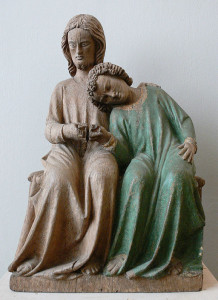Of the four gospels, critics direct most of their fire at those of Matthew and John. This is, in part, because Matthew and John are the only two gospels that tradition says are direct, eyewitness accounts, written by original disciples of Jesus. If Matthew and John are eyewitness accounts, then they greatly strengthen the case that the gospels are historically accurate documents…and some skeptics do not want that. Critics also challenge the authorship of these gospels because the evidence regarding them is sometimes confusing, making it more difficult to discern who actually wrote what. Continue reading
Monthly Archives: March 2015
A Historical Case for The Resurrection of Jesus
Easter is just around the corner, that time each year when Christians celebrate the death and resurrection of Jesus. Christians believe that Jesus was God in the flesh, who came to earth and allowed himself to be sacrificed for the sins of each human being, paying the wages of sin on our behalf. Three days later, the teaching goes, Jesus overcame death via the resurrection and, through Him, provides each one of us a path to eternal life.
It makes for an interesting—and quite incredible—story. Skeptics down through the ages have attempted to disprove it, directing their fire at the key pieces of the story: 1.) Jesus’ death by crucifixion; 2.) His burial in a tomb; and 3.) Various elements related to the resurrection itself. Continue reading
Defending the Gospel of John
Of all the gospel accounts, the Gospel According to John is the most controversial. It stands apart from the three “synoptic” gospels of Matthew, Mark, and Luke. John is more sophisticated theologically and contains some of the most beautifully-written verses in the New Testament. It was, according to Christian tradition, written by the Apostle, John. John was one of Jesus’ 12 original disciples, and is referred to as the “Beloved Disciple” of Christ. This work is important not only because of its theological insights, but also because it supposedly reflects an eyewitness account of Jesus’ ministry and teachings. Continue reading
Judge Not…
 In previous articles, we discussed how our behaviors and attitudes interact with salvation, and what God expects from us in these areas. We also briefly mentioned how today’s culture doesn’t always accept these values and is quick to call Christians old-fashioned, close minded, or judgmental when they advocate for God’s standards. All too often, some people attempt to silence Christians from espousing biblical ethics by quoting “Judge not, so that you will not be judged” from Matthew 7. Continue reading
In previous articles, we discussed how our behaviors and attitudes interact with salvation, and what God expects from us in these areas. We also briefly mentioned how today’s culture doesn’t always accept these values and is quick to call Christians old-fashioned, close minded, or judgmental when they advocate for God’s standards. All too often, some people attempt to silence Christians from espousing biblical ethics by quoting “Judge not, so that you will not be judged” from Matthew 7. Continue reading
How Should A Christian Act?
 In a previous article, we discussed how works result from, rather than in, a person’s salvation. Now we turn our attention to what those works should be. The Bible states that as Christians, we are Christ’s representatives (2 Corinthians 5:20) and are called to do good works (Ephesians 2:10). The question naturally arises “what should this look like?” Our purpose in this article is to give an overview of how God expects Christians to be and act, as articulated in scripture. This is not an exhaustive analysis, but rather a starting point for self-examination and further study. Continue reading
In a previous article, we discussed how works result from, rather than in, a person’s salvation. Now we turn our attention to what those works should be. The Bible states that as Christians, we are Christ’s representatives (2 Corinthians 5:20) and are called to do good works (Ephesians 2:10). The question naturally arises “what should this look like?” Our purpose in this article is to give an overview of how God expects Christians to be and act, as articulated in scripture. This is not an exhaustive analysis, but rather a starting point for self-examination and further study. Continue reading
Saved by Faith or Works?

The Apostle, Paul, who played a critical role in spreading the Church to the Gentiles during the first century.
The role of faith vs. works in salvation has been the subject of debate and confusion since the beginning of Christianity. Paul clearly states in Ephesians that we “are saved by faith…not by works” while James says that “faith without works is dead.” So which is it? Are we saved by faith, works, or some combination of the two?
The Case for Faith
The Bible is clear that we are saved “by grace through faith” in Christ. But what exactly does that mean? In short, salvation by grace through faith means that we do not earn it through our own actions. It is an unmerited gift from God (i.e. “grace”) given “through faith” in Christ as our personal savior. There are many Bible verses one can cite to explain what “faith in Christ” means, but one of the clearest is Romans 10:9 (“If you confess with your mouth that Jesus is Lord and believe in your heart that God raised Him from the dead, you will be saved.”) Continue reading



